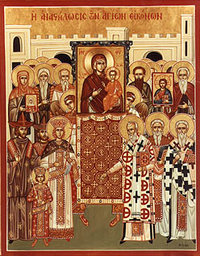Sunday of Orthodoxy
The Sunday of the Triumph of Orthodoxy is celebrated on the first Sunday of Great Lent. It is the celebration of the victory of the iconodules over the iconoclasts by the decision of the Seventh Ecumenical Council. Therefore, the service is to commemorate the restoration of icons for use in services and private devotional life of Christians.
Services often include the clergy or the faithful triumphantly processing around the church, holding icons of their patron or parish saints. In areas where multiple jurisdictions exist (such as the United States), Pan-Orthodox Vespers are also usually celebrated in the evening.
Themes
Each of the Sundays of Great Lent has its own special theme. In the course of Church history, almost each Lenten Sunday has obtained a second theme, a historical theme. Originally the Lenten fast was the time for catechumens to prepare for baptism and entry into the Church. The Sunday spiritual themes were part of the early Christian catechesis.
Historical theme
The theme of the day is victory of the True Faith. "This is the victory that overcomes the world, our faith" (1 John 5:4). Also, the icons of the saints bear witness that man, "created in the image and likeness of God" (Gen 1:26), becomes holy and godlike through the purification of himself as God's living image. The connection of the victory over iconoclasm with Lent is purely historical; the first Triumph of Orthodoxy took place on this particular Sunday.
Spiritual theme
The first Sunday of Great Lent originally commemorated the Prophets such as Moses, Aaron, and Samuel. The Liturgy's alleluia verses and scripture readings appointed for the Sunday of Orthodoxy reflect this older usage. The Epistle reading is a completion of Hebrews 11:24-26, 32-12:2. The yet-to-be-baptized catechumens of the early church heard the Epistle about the Old Testament men who lived by their faith in a promise whose fulfillment they did not see. After the righteous of the Old Testament are mentioned, the Epistle says: And all these, having obtained a good testimony through faith, did not receive the promise, God having provided something better for us, that they should not be made perfect apart from us.
The Gospel lesson is John 1:43-51, and it ends with a explanation of the something better of the Epistle: "You will see greater things than these." And He said to him, "Most assuredly, I say to you, hereafter you shall see heaven open, and the angels of God ascending and descending upon the Son of Man." The catechumens of the early church, and the faithful preparing for Pascha today, are told that, with faith, they will see the inauguration of the new age, the fulfillment of all promises, and the manifestation of the Kingdom, through the Incarnation, in the Church.
Hymns
- We venerate Your most pure image, O Good One,
- and ask forgiveness of our transgressions, O Christ God.
- Of Your own will You were pleased to ascend the Cross in the flesh
- to deliver Your creatures from bondage to the enemy.
- Therefore with thanksgiving we cry aloud to You:
- You have filled all with joy, O our Savior,
- by coming to save the world.
- No one could describe the Word of the Father;
- but when He took flesh from you, O Theotokos, He accepted to be described,
- and restored the fallen image to its former beauty.
- We confess and proclaim our salvation in word and images.
Source
- Great Lent: Journey to Pascha, by Fr. Alexander Schmemann (1974). St. Vladimir's Seminary Press. ISBN 0913836044
